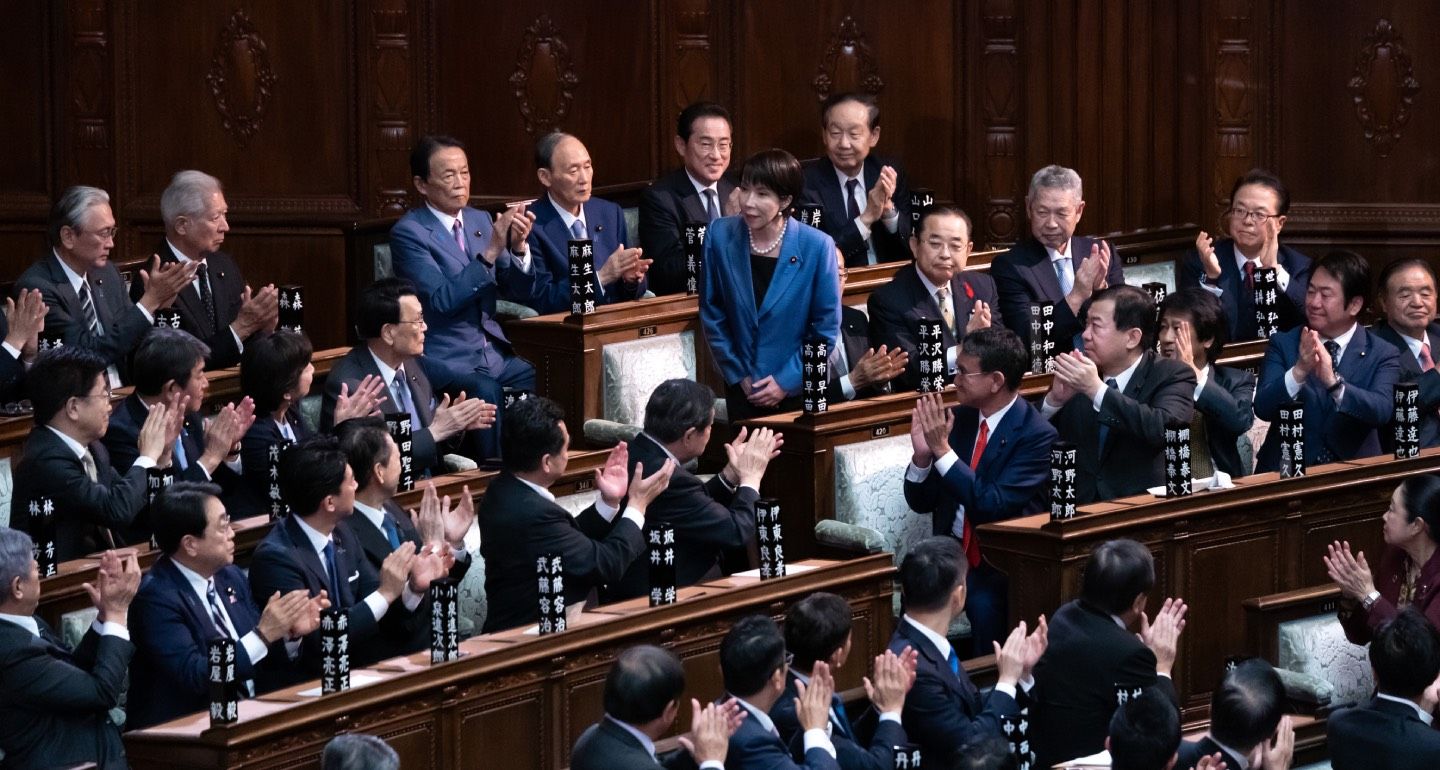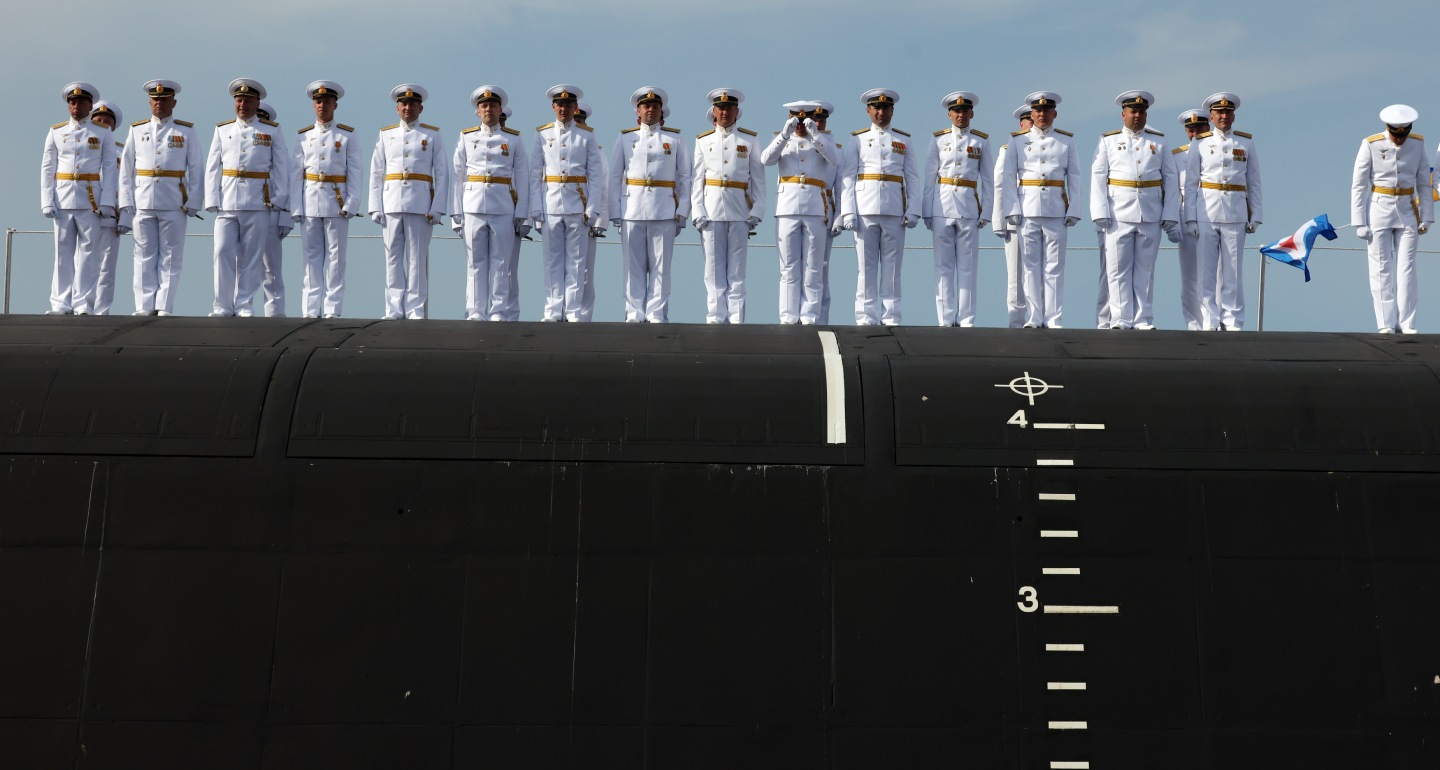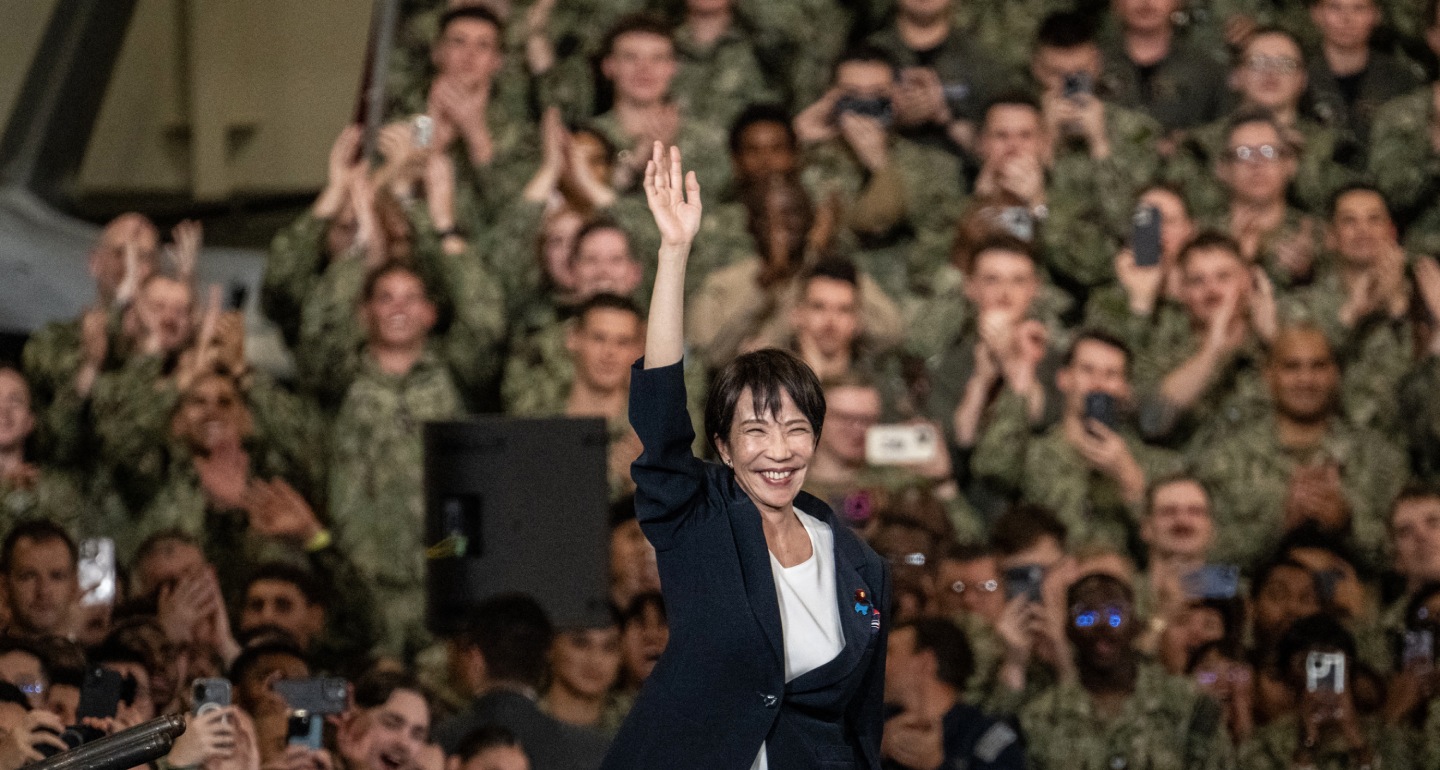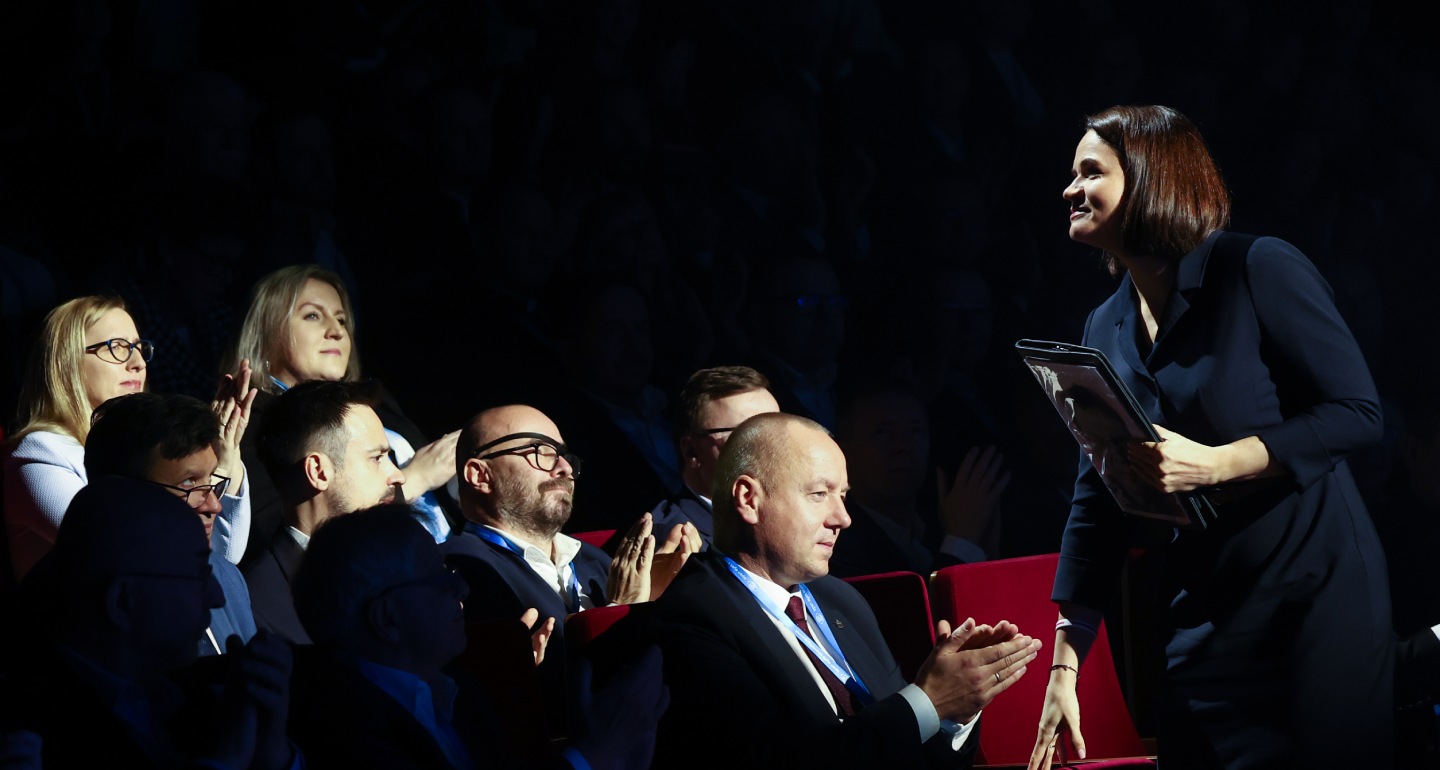The typical image of a Japanese prime minister is a man of late middle age in a dark suit, white shirt, and conservative blue tie. His thinning hairline and sallow complexion speak of countless late nights spent diligently cultivating contacts within Japan’s insular political elite.
Their similarity, lack of charisma, and rapid turnover make Japan’s leaders forgettable. In June 2025, U.S. President Donald Trump failed to recall the name of then Japanese prime minister Ishiba Shigeru, calling him “Mr. Japan.”
Takaichi Sanae, who took over as Japanese leader on October 21, stands out from this identikit lineup, not least because she is a woman. This is a remarkable development in a country often regarded as patriarchal. Of the 465 members of Japan’s House of Representatives, only seventy-three are women. In the World Economic Forum’s 2025 Global Gender Gap Report, Japan ranked 118th out of 148 countries. That Japan should now have a female leader—something that has never been achieved in fellow G7 members France and the United States—is a historic breakthrough.
Her gender is not the only thing that makes Takaichi distinctive. Unlike so many Japanese politicians, she is not from an established political family. Of her four immediate predecessors, three were the sons of politicians. In the case of Abe Shinzo, who led Japan from 2012 to 2020, his father was foreign minister, and his grandfather prime minister.
Compared to such political royalty, Takaichi has humble origins. She was born in 1961 in Yamatokoriyama, a small city in Nara prefecture, one of Japan’s poorest. Her father worked for a car parts maker and her mother for the local police department.
Takaichi’s parents offered little support for her higher education, feeling it was not necessary for a girl to attend university. She was therefore forced to decline the opportunity to study at an elite institution in Tokyo, enrolling instead at the mid-ranking Kobe University. There, Takaichi became a fan of heavy metal music and motorbikes. Photos from those days show her playing drums and straddling a Kawasaki Z400GP, unusual hobbies for a future Japanese leader.
And yet, while she breaks the mold in several respects, in others Takaichi is conservative or even reactionary.
After entering parliament in 1993 as an independent, Takaichi forged close ties with Abe and began to echo many of his socially conservative and nationalist views. Despite being a woman, Takaichi is no feminist. She insists on retaining the current system that only permits male-line descendants of the emperor to succeed to the throne. She also opposes a reform to allow spouses to retain separate surnames after marriage.
Some aspects of her foreign policy sound positively Trumpian. When campaigning for the leadership of her party in September, Takaichi stated, “We must once again declare loudly, ‘Japan is back,’” reviving a slogan made popular by Abe. She continued, “I stand here with the lofty ambition and burning desire to bring Japan back to the top of the world.”
Additionally, she has railed against immigration and argued for the need to protect Japanese traditions. This has extended to criticizing tourists, whom she accuses of failing to obey Japanese laws, including by allegedly kicking deer at a famous park in Nara.
Most controversially, Takaichi has followed in the footsteps of her mentor Abe, who was assassinated in July 2022, by making regular visits to the Yasukuni Shrine. Most recently, she visited on August 15, 2025, the eightieth anniversary of Japan’s surrender in World War II. Such trips are controversial in China and Korea because Yasukuni enshrines the souls of Japan’s war dead, including fourteen Class-A war criminals. To critics, this makes Takaichi look like an unrepentant defender of Japanese militarism.
Takaichi has also angered Beijing by replacing Abe as Japan’s leading supporter of Taiwan. She describes the self-governing island as “an extremely important partner and a valued friend for Japan.” During a visit to Taiwan in April 2025, she even proposed creating a “quasi-security alliance” that would bring together Japan and Taiwan, as well as Australia, India, and European partners.
Since Takaichi’s political positions and rhetoric are so often copied and pasted from her late mentor, it might seem that her elevation to prime minister should be good news for Russia. After all, Abe was a tireless advocate of closer ties. He invited Vladimir Putin to his hometown in 2016 and praised the Russian leader in 2019 as “my dear friend, with whom I have built a relationship of deep trust.” Abe proposed an eight-point economic cooperation plan. He also attempted to resolve the countries’ territorial dispute over the Southern Kurils/Northern Territories by indicating that Japan could settle for the return of just two of the four disputed islands.
However, anyone in the Kremlin expecting Takaichi to revive Abe’s pro-Russia policy will be disappointed.
Takaichi has strongly criticized Russia’s invasion of Ukraine. She was quick to recognize that Russia’s aggression impacts Japan’s own security, stating in March 2022 that “Ukraine is not an affair happening far away … This is not a distant matter.” She has remained faithful to this position, arguing during the campaign for leadership of the Liberal Democratic Party that Japan’s sanctions on Russia “should be thoroughly strengthened.”
In retaliation for her tough stance, Moscow imposed a personal visa ban on Takaichi that prevents her from traveling to Russia. She responded dismissively, saying “Even if invited, I wouldn’t go!”
The reason why Takaichi’s position diverges so much from Abe’s is because so much has changed since he left power in 2020. It was one thing for a Japanese leader to attempt rapprochement with Russia in 2012. It would be quite another to do the same in 2025.
The issue is not just that Russia has started the largest war in Europe since 1945. It is also that Moscow signed a comprehensive strategic partnership agreement with North Korea in 2024 and is providing Pyongyang with military and technological cooperation. From Japan’s perspective, this makes Russia an accomplice to a regime that openly threatens Japan with ballistic missiles and nuclear weapons, and which is known to have abducted Japanese citizens.
Takaichi’s ardent support for Taiwan also underpins her opposition to Russia’s invasion of Ukraine. This is due to the fear that if Moscow were able to succeed in conquering Ukraine, Beijing may be emboldened to try the same against Taiwan. In this respect, Takaichi’s outlook is closer not to Abe, but to former prime minister Kishida Fumio (2021–2024), who regularly stated that “Ukraine today could be East Asia tomorrow.”
Added to this, all Japanese politicians have been made less likely to consider reengagement with Moscow by Russia’s recent provocations, which mirror aspects of its gray-zone campaign against European countries. Designed to punish Japan for standing with Ukraine, these asymmetric measures included the repeated violation of Japanese territorial airspace in September 2024. A Russian spy ship has also persistently probed the contiguous zone near Japan’s coastline.
Since 2022, there has also been an explosion of cyberattacks against Japanese companies and government websites by Russia-based ransomware groups and patriotic hackers. The highest-profile of these took place against the Port of Nagoya in July 2023. Whether state-sponsored or merely state-tolerated, these cyber intrusions have further reinforced Russia’s image as a threat to Japan.
In short, while in some respects Takaichi may seem like a female version of Abe Shinzo, she will not revive his Russia policy. Instead, for as long as Putin’s war in Ukraine grinds on and Russia continues to undermine Japan’s security, Japan-Russia relations will remain in the deep freeze.











